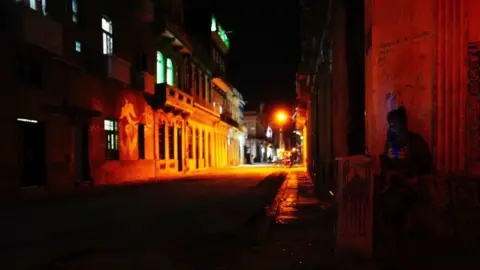Cubans stage rare street protest over power blackouts
 Reuters
ReutersHundreds of people in Cuba's second-largest city, Santiago, staged a rare public protest on Sunday over chronic power blackouts and food shortages.
The island is facing its worst economic crisis for three decades, with large parts of Cuba being left without power for more than 14 hours a day.
Videos on social media show people chanting "power and food".
Its president blames the situation on US sanctions, but critics say it is down to government mismanagement.
Since 1960, the US has maintained an economic embargo against Cuba which puts strict rules on trade between the countries.
The economy in Cuba, a communist-run island with a population of about 11 million, has been in dire straits in recent years. The coronavirus pandemic put further strain on the cash-strapped nation, which has led to vast shortages of food, fuel and medicine.
In February, the government asked the UN's food programme for help with food shortages, sending an unprecedented request for assistance in providing powdered milk to children under the age of seven.
But tensions have soared in recent weeks as power generators fail to get the fuel they need for electricity in people's homes and for storing food in fridges and freezers. Record-breaking numbers of Cubans have migrated to the US because of the economic conditions.
A 65-year-old in Santiago told AFP news agency electricity in the city was restored later on Sunday and "two truckloads of rice" were delivered.
Santiago is 800km (500 miles) east of the capital, Havana. The US embassy there said on X it was aware of reports of "peaceful protests" in Santiago, Bayamo and other parts of Cuba.
"We urge the Cuban government to respect the human rights of the protesters and address the legitimate needs of the Cuban people," it added.
Cuba's President Miguel Diaz-Canel acknowledged the protests on social media and said the "disposition" of his government and authorities was "to attend to the complaints of our people, listen, dialogue, explain the numerous efforts that are being carried out to improve the situation".
Earlier this month, the government imposed an eye-watering price hike on fuel as part of its economic recovery plan - meaning fuel that is available costs more than five times as much as before.
According to official estimates, Cuba's inflation rate has reached 30%, but Reuters news agency says experts think the figure is likely to be higher.
